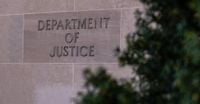The Justice Department's civil rights division is undergoing a significant transformation as it faces a mass exodus of attorneys, with over 100 departures reported in recent weeks. This shift follows the appointment of Harmeet Dhillon, a staunch supporter of President Trump, who has outlined a new direction for the division that diverges sharply from its traditional mission.
Established in the wake of the 1950s Civil Rights movement, the civil rights division has long been tasked with enforcing federal laws aimed at protecting the rights of marginalized groups. However, under Dhillon's leadership, the focus is shifting towards priorities laid out by the Trump administration, including legal actions against states allowing transgender athletes to compete in women's sports and a renewed emphasis on combating perceived anti-Christian bias.
In a recent interview with conservative commentator Glenn Beck, Dhillon stated, "What we have made very clear last week in memos to each of the 11 sections in the Civil Rights Division is that our priorities under President Trump are going to be somewhat different than they were under President Biden." She added, "En masse, dozens and now over 100 attorneys decided that they'd rather not do what their job requires them to do," suggesting that those who disagree with the new direction are free to leave.
The mass resignations have raised alarms among civil rights advocates and former officials who warn that the division's capacity to protect vulnerable populations is being severely compromised. Stacey Young, a former civil rights attorney and current executive director of Justice Connection, expressed concern, saying, "The impact is catastrophic. They are scaling back possibly, nearly all enforcement that they have been doing for decades on civil rights statutes they're required to enforce." Young fears that the dismantling of the division will lead to unchecked discrimination in various sectors, including education, housing, and voting.
In the weeks following Dhillon's swearing-in, the Justice Department has taken several controversial actions. It withdrew from a Biden-era lawsuit against Georgia's voting laws and has initiated a task force to investigate incidents of alleged anti-Christian bias. Additionally, the division has shifted its focus away from protecting the rights of transgender individuals, including withdrawing support for cases involving transgender prison inmates.
According to reports, the division, which employed around 380 attorneys at the start of the Trump administration, could be left with as few as 140 attorneys following the mass resignations. This drastic reduction in personnel raises questions about the division's ability to fulfill its foundational mission of protecting civil rights.
Former deputy assistant attorney general for civil rights, Justin Levitt, criticized the changes, stating, "The only reason you do that is if you didn’t think that the laws were worth enforcing. That actually should really raise eyebrows in Congress." He emphasized that the civil rights division has historically operated as a nonpartisan entity, enforcing laws across administrations of both political parties.
Dhillon's approach has also included the introduction of new mission statements for the division's sections, which now reference directives from Trump aimed at addressing issues like "woke ideology" and diversity initiatives. Critics, including Vanita Gupta, who led the division under President Obama, have described these changes as a fundamental transformation of the division's purpose. Gupta stated, "This is not simply a change in enforcement priorities — the division has been turned on its head and is now being used as a weapon against the very communities it was established to protect."
As the division continues to experience significant turnover, many current and former employees express feelings of despair and trauma. Young noted that morale is plummeting, with many employees feeling disillusioned about their ability to enact meaningful change in the face of the new policy direction. "I think people were very hopeful that some of their important work would be preserved, but I think people are losing hope in that possibility," she said.
The Justice Department's civil rights division has historically played a crucial role in upholding the rights of marginalized communities, including monitoring police conduct and ensuring equitable access to voting. However, the current administration's focus on dismantling diversity initiatives and pursuing cases against perceived liberal biases represents a stark departure from that mission.
In light of these developments, civil rights advocates are calling on nonprofit organizations and private law firms to step in and fill the gap left by the Justice Department's shifting priorities. Arthur Ago, director of strategic litigation at the Southern Poverty Law Center, acknowledged the challenges ahead, stating, "It makes our work a lot harder," as the loss of allyship in the federal government complicates their efforts to address discrimination.
As the deadline for accepting the deferred resignation offer approaches, the civil rights division faces an uncertain future. The sweeping changes initiated by the Trump administration and carried out by Dhillon have raised concerns about the long-term implications for civil rights enforcement in the United States. With a significant portion of the division's workforce set to depart, advocates worry that the protections established over decades may be jeopardized.
In her defense of the changes, Dhillon has asserted that the division's new direction aligns with the administration's priorities and reflects a commitment to enforcing federal civil rights laws. However, the ramifications of these shifts are likely to resonate throughout the legal landscape, potentially leaving vulnerable populations without the protections they have historically relied upon.





